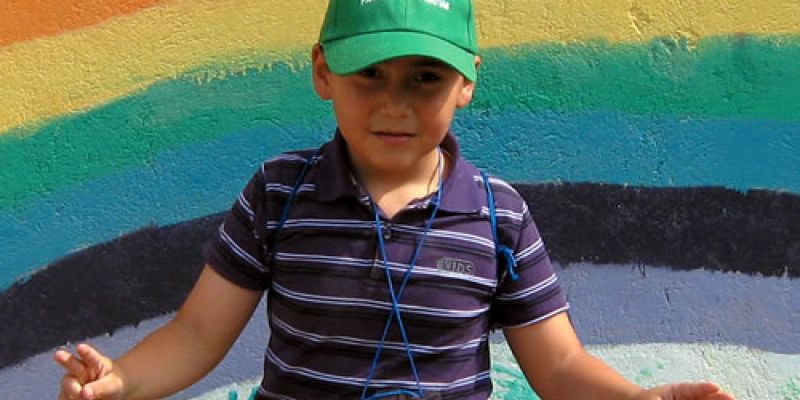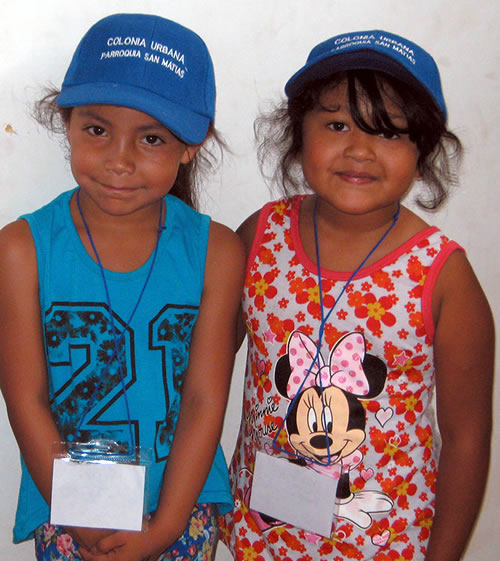
Urban Summer Camps
Growing up in New York City, summers for me were times for relaxing, recreation and fun. There were family picnics, trips to the beach, baseball games, and books to be read and time to relax with my friends. But, summers for many, if not most, of the children in the poblaciones (housing estates for the poor) of Puente Alto – located in the urban area of Santiago, Chile – are not so enjoyable. They live in the overcrowded apartment blocks which were built during the 1980s to accommodate the poor. There are few parks or recreational activities. Their parents set off for work early in the morning and do not return until late at night which means that many children must wait for their parents to come home to prepare dinner.

Days are spent cooped up in the apartment watching television, playing soccer on the streets or playing with a toy which they received for Christmas. Summers are often boring and in some cases dangerous. These housing estates are places where drug trafficking is part of life and where a stray bullet can take the life of an innocent bystander.
Last year, we decided to reach out to the children of Puente Alto, especially in the poorest areas of the Maipo Vicariate where I am the Episcopal Vicar. The Archdiocese of Santiago had developed a system of working with the children known as colonias urbanas (urban summer camps). A colonia urbana is a recreational program for children who live in our poblaciones and who are not fortunate enough to be able to enjoy the summer taking trips, going to the beach or just getting away.
A well-run colonia urbana fulfills five prerequisites: recreation, values formation (taken from the Gospels), handicrafts, excursions and nutrition. It takes a lot of preparation and organization to run a successful colonia urbana. Monitores (volunteers) must be recruited and trained. Donations of food and educational materials are sought. A team of cocineras (cooks – usually mothers or grandmothers of the children) has to be in place in every parish. The colonias provide the children with dinner and an afternoon snack. It is no small job to feed 150 hungry kids!
Camila Pastene, a young social worker, came to our vicariate and with great enthusiasm set about the task of organizing and improving our colonias. Camila formed a committee which included several religious Sisters, two priests and several young volunteers. Together they produced a handbook for values formation. There were training sessions for the young volunteers. Each day of the colonia has to be planned carefully. One of the principal aims of the colonias is to strengthen the formation of Christian and human virtues.
A different virtue is presented and practiced every day: friendship, respect for others and for the environment, team work, solidarity, love of God and neighbor, etc. At the center of every colonia is the person of Jesus who loves all children and wants them to draw near to Him. The children are divided up into alliances (red, blue, yellow, green etc.) which compete every day for points in the different activities of the day.
The alliances build a sense of belonging and stress the importance of team work. At the end of the colonia, small prizes are distributed. No one is left without a prize! Mornings begin with a reading from the Scriptures and a short prayer which is followed by singing songs and doing some physical exercise. Next there are competitions through various group dynamics. Occasional breaks are scheduled between group dynamics. At the end of the morning, all the alliances will gather to sing a hymn or share about how they lived out a particular virtue. The alliance which accumulated the most points is either applauded or booed, and the other alliances are encouraged to do better tomorrow.
Chileans eat their main meal in the middle of the day and at 1:00 p.m., it is time for dinner. A menu is prepared for each day. Like many other countries in the world, hot dogs and French fries are very popular. Less popular are the salads and vegetables. Gallons of fruit juice are consumed. It is a rare sight to see a plate which is not empty.
In the afternoon, the children take part in various talleres (workshops): guitar, dancing, cooking, pizza making, mosaics, knitting, painting etc. At least once a week, the children leave their poblaciones and are taken on an excursion. This year, they visited a zoo. We were able to obtain a discount for 700 children in a popular zoo called “Buinzoo.” Other groups were taken to the municipal pool with no charge for their entrance. One of our pastors organized a trip to the beach!
It takes a huge effort to finance these urban summer camps. It requires a collaborative effort on the part of our parishes. In some cases we were able to obtain donations of food from the government while other parishes organized food campaigns and visited the local open air markets soliciting donations. The Archdiocese of Santiago donated some of the materials for arts and crafts. The local municipality agreed to provide several buses to take the children to the zoo and to a municipal swimming pool, but there were so many children that we had to pay for half of the buses.
In fact, these donations were insufficient to meet the costs. Without help from Columban benefactors as well as family and friends, we would have had to reduce the number of colonias in our vicariate. Thanks to this help, we were able to increase the number of colonias!
In January 2016, we were able to run seventeen different colonias, three of them in the Columban parish of San Matías. Most colonias last for a week or in a few cases ten days. An estimated number of 1,500 children benefit from these efforts to make summer more enjoyable. Our hope is to extend the time for all the colonias to two weeks and to run shorter colonias during the winter holidays.
We have made a good beginning, and with our continued efforts and the support of benefactors, the work of the colonias can continue to grow and touch the lives of more children. If we could run a colonia every Saturday in our poblaciones, life would change for so many children!
Columban Fr. Michael J. Hoban lives and works in Santiago, Chile.


 The Columbans are a society of missionaries, including priests and lay people, who minister to people of various cultures as a way of witnessing to the universal love of God.
The Columbans are a society of missionaries, including priests and lay people, who minister to people of various cultures as a way of witnessing to the universal love of God.